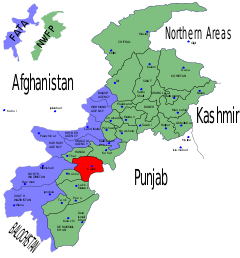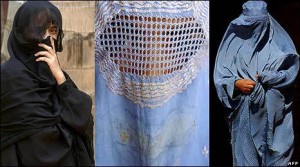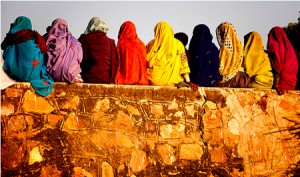‘Women in Hiding’, Directed by Taliban, Running Successfully in Dark Corners – by A Z
The above production has now hit the marketplace of Karak, a town in KPK, which is ruled by the PTI. Karak is the district headquarter of Karak District, whose population is almost entirely comprised of Khattak tribe. This news can be seen in the following article in the country’s arguably most respected newspaper.
According to this piece, a committee of local clerics (ulema) in Khyber Pakhtunkhwa’s Karak district banned the entry in markets of women who are not accompanied by a ‘mehram’ (a family member not eligible to marry the woman in question). We wait to see how the PTI’s government in the province reacts to the news.
This is another manifestation of religiously contrived sexual discrimination through intensified gendering of a public space, thus calling our attention to something, which is a lot more important than a nonsensical decree from some insignificant Mullahs in a small town. Again it harks back to many Muslims’ tendency to draw a line in the sand in suggesting that the responsibility for prevention of perversion falls on the victims – women.
We all know that city streets and public space is the domain in which social values are asserted and contested. The definitions of spatial boundaries and of acceptable and non-acceptable uses and users are, at the same time, expressions of intolerance and difference within society. Here is another example of the ways in which suspicion, intolerance, and moral censure limit the spatial or social freedom of women in Pakistan. The two main strategies that are used in Pakistan to control the presence and conduct of women, in otherwise diverse and democratic places like streets and markets, have been tribal customs and religious conservatism. Both these are employed to reduce women to a marginalised community in large swathes of our national territory. The continuous struggle of Pakistan’s women for acceptance in public urban spaces should remain an issue of debate such that advocacy is given platform.
Unfortunately ours is a society where vice and virtue are centred on women, particularly on their bodies, which must be veiled and properly guarded. Also women’s movements and conduct is a traditional area of men’s authority in tribal societies. Hence the woman cannot be ‘immorally’ positioned in the man’s space. The levels of tolerance differ among various cultures and places in the country but the guiding principle remains the same as women continue to struggle to be recognised as equal users of urban public space and overcome patriarchal systems of interaction within such spaces. This is a debate that should continually be engaged in such that social practices are reframed and patriarchal assumptions of public space reconstructed for a more inclusive public space.
The unequal accessibility of public space according to gender further enhances religiosity in the society as women are then reduced to carving out religiosity as a social space. The religious groups as social communities seeking to enhance the knowledge of religion do not challenge the social and political order of the society and thus provide women with a social space that does nothing to reduce the general discrimination against them.
Why can’t we reach the sensible conclusion that deviants should be held accountable for their crimes instead of believing that the average Muslim man cannot control his urges, and therefore, all women have to shield the men from temptation by covering themselves from head to toe? Another question that is pertinent to ask is why there are so many rapists in this conservative country? Even children are not spared? Definitely religion does not play a role here. It is the people. The male dominated countries of the subcontinent and many other parts of Muslim world are exploiting the woman they are supposed to protect. The trouble is these countries talk about religion as if they are the most pious people on earth. They are the only chosen people on earth. They use religion to camouflage their animal instinct. Still like politics this animal called ‘man’ often uses religion as a tool to take advantage of women. How come this ‘specie’ cannot stand the sight of woman? Even animals do not rape, they mate when the female is on heat. So how come we have created societies where people think about little else other than sex. That is probably why our countries contribute nothing constructive in terms of technological development. Everything is about sex.
Punishing women because of the inability of men to control themselves is an outrage. Muslims should be up in arms about this kind of “teaching” as it demeans our religion. Mind you, I apply this same standard to the Christians who view rape as just another way for a woman to conceive. Christians and Muslims should unite against these outrageous people.
These double standards will not melt away so easily. Muslim men have enjoyed too much control over their women for far too long and will not cede in one generation. However the change has to start somewhere. If they are sincere they should begin by changing all legal norms and authoritative interpretations.





Women have to conform to the moral or ethical standards in their own good. Women may be targeted because they are particularly vulnerable, for example, those with caring responsibilities or young women who can easily be sexually abused. Women may be persecuted by members of their family and/or community. Therefore we need to have a culture to protect them.
The concept of women being persecuted as women is not the same as women being persecuted because they are women. The concept of gender-specific persecution addresses forms of persecution that are specific or more likely to happen to women including, for example, sexual violence, female genital mutilation, forced abortion and sterilisation and denial of access to contraception. Understanding the ways in which women are violated as women is critical to naming as persecution those forms of harm that only or mostly affect women.
To say that a woman fears persecution because she is a woman (gender-related persecution) addresses the causal relationship between gender (as socially constructed) and persecution. For example, sexual activity outside a socially condoned relationship may result in persecution.
Hence, our culture and our religion protects women.
Gender-specific violations do not necessarily constitute persecution because of gender. For example, if a man’s genitals are subjected to electric shocks, he is being tortured in a gender-specific way, but it does not necessarily follow that he is being persecuted because of his gender rather he may be persecuted because of his political or religious identity or activities. Similarly many women experience gender-specific forms of persecution, including rape and sexual violence, because of their actual or imputed political or religious identity or activities. It is important not to assume that in all women experience gender-related persecution even where this persecution takes a gender-specific form.
The reasons for the persecution are critical in establishing the appropriate reason. Rather than maligning our culture. Women in Afghanistan and Pakistan are the safest in the world.
such restrictions may in themselves constitute ‘serious harm’. For example, dress codes may violate a woman’s right to freedom of conscience, expression or religion, either in themselves or because of the consequences of the refusal, failure or inability to comply. A broad range of penalties may be imposed for disobeying restrictions placed on women. Such penalties will often constitute ‘serious harm’, particularly where the level of punishment for violating discriminatory norms is disproportionately severe.
A state that fails to protect its citizens in general may also fail to protect its women. It does not mean persecution of women in particular.
If, it is not always reasonable or possible for a woman to alert the authorities to her need for protection, for example, if by doing so she risks violence, harassment or rejection by her society or even persecution. Then that is true for all of us. The implications of gender in determining the reasonableness of an internal flight alternative should also be recognised in assessing the situation. Women may have family ties i.e. children which may have a bearing on the reasonableness of internal flight.
It is important not to underestimate or overlook the political dimensions of a woman’s experiences of persecution even though a woman may not regard herself as making a political statement. Non-conformist opinions or behaviour may in certain circumstances be the expression of a political opinion or may result in a woman having a political opinion attributed to her whether she holds one or not. It does not mean that she is discriminated against because of being a woman.
Our society tolerates non-conformist behaviour such as refusing to wear a veil or choosing a partner herself much better than the West puts up with what is non-conformist for it. For example, wearing a burqa.
Most women who are persecuted in our societies will be covered by other reasons i.e. religion, ethnicity and political opinion, whether actual or imputed. Don’t put that under gender violence.
To sum it up.
Gender-specific harm is not different from other forms of ill treatment and violence that are commonly held to amount to persecution. Social and cultural norms regarding appropriate gender roles and behavior do not mean that women face violations of their human rights. Islam looks after women rights better than the West ever did or does now.
Down with the Wahabi/Salafi/Deobandi suppression of Muslim women. They are AIDS virus for the Muslim society.
Excellent article Ali!
“Hence, our culture and our religion protects women.” No…Protecting women, by sequestering them and covering them from head to toe with a Burqa violates a woman’s freedom. According to Freedom Index, of Freedom House, not a single Muslim -majority country can be defined as fully free. Some of the comments above illustrate, also in a veiled way, that even political opinions, might cause terribe repercussions on a woman. The arrogance, that men think they know best how to protect woman, comes from one place: To have complete control over them- no liberties .
This is soley based on exaggerated interpretation of the Quran, a cultural deviancy; It is the tribal mentality that is at fault, not Islam. The very contrast between reasonablly modest mode of dress in Turkey versus the extreme of Wahhabi-Saudi Arabia, and Salafist draconain demands of Taliban, confirm that it is not Islam to blame for the loss of freedoms for women- it is feudal misogynistic mentaality for control over females, from weak men afraid of women if they are educated and liberated as was Benazir Bhutto (Parents Sunni and Shia).
Thanks, Rusty bhai.